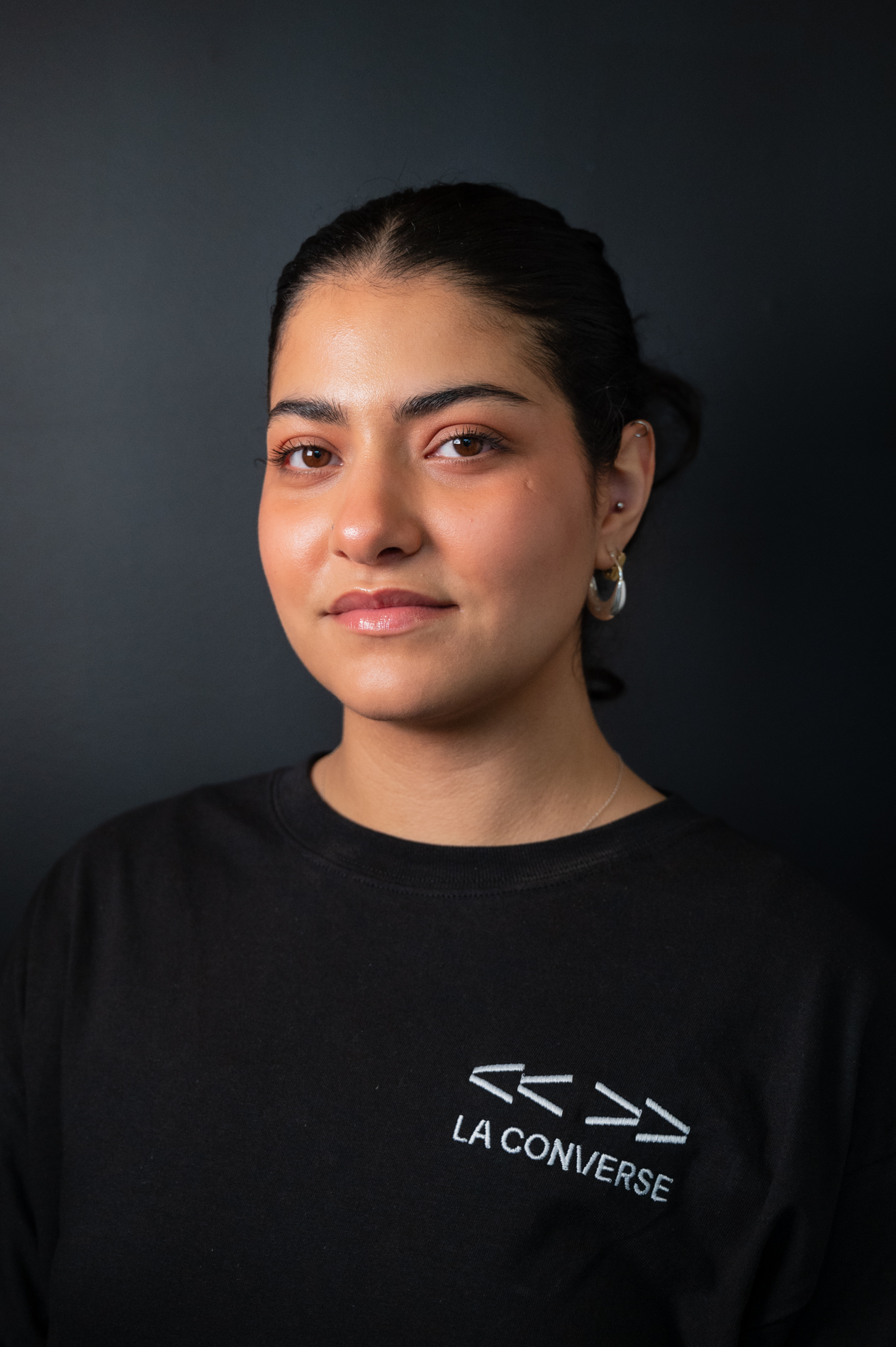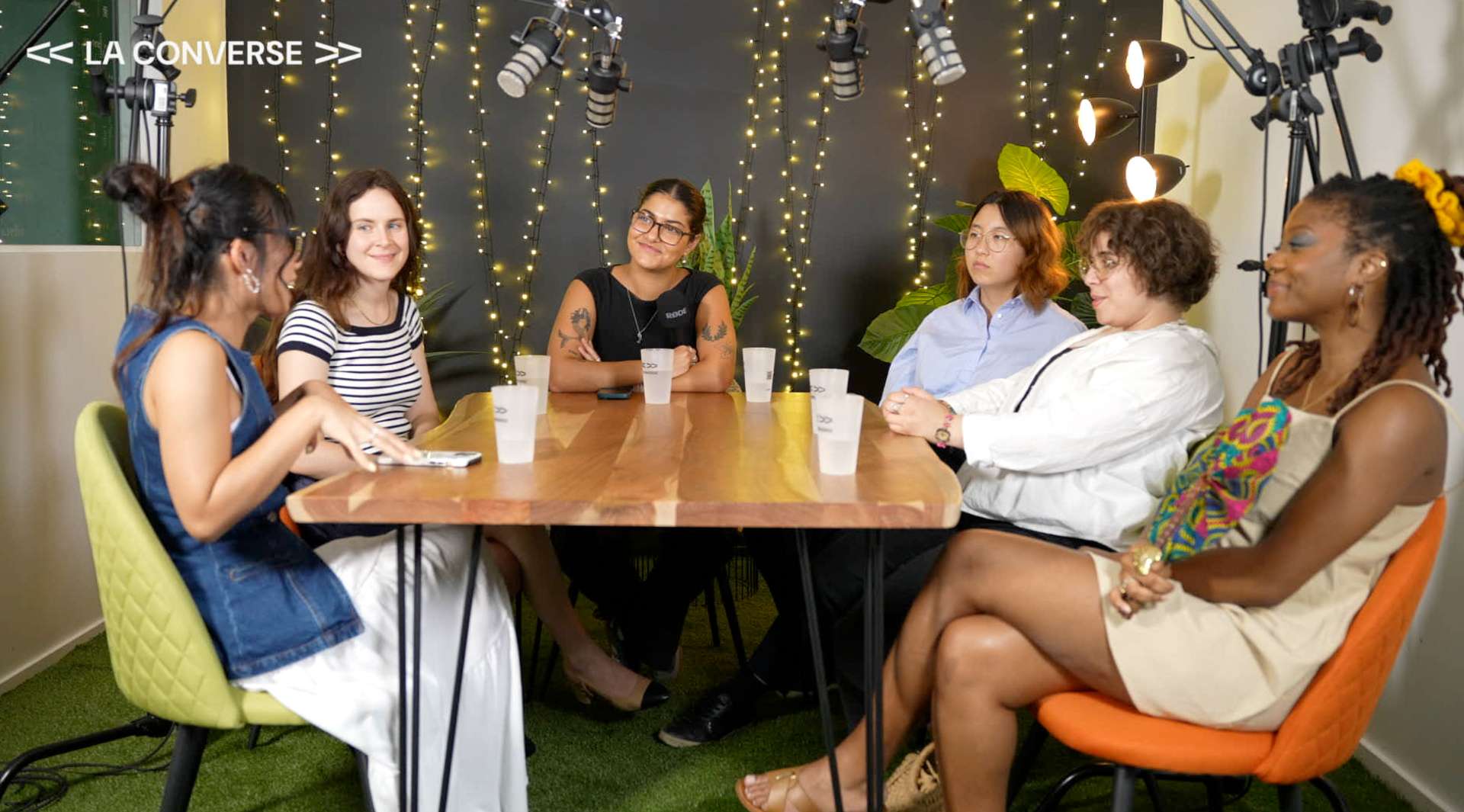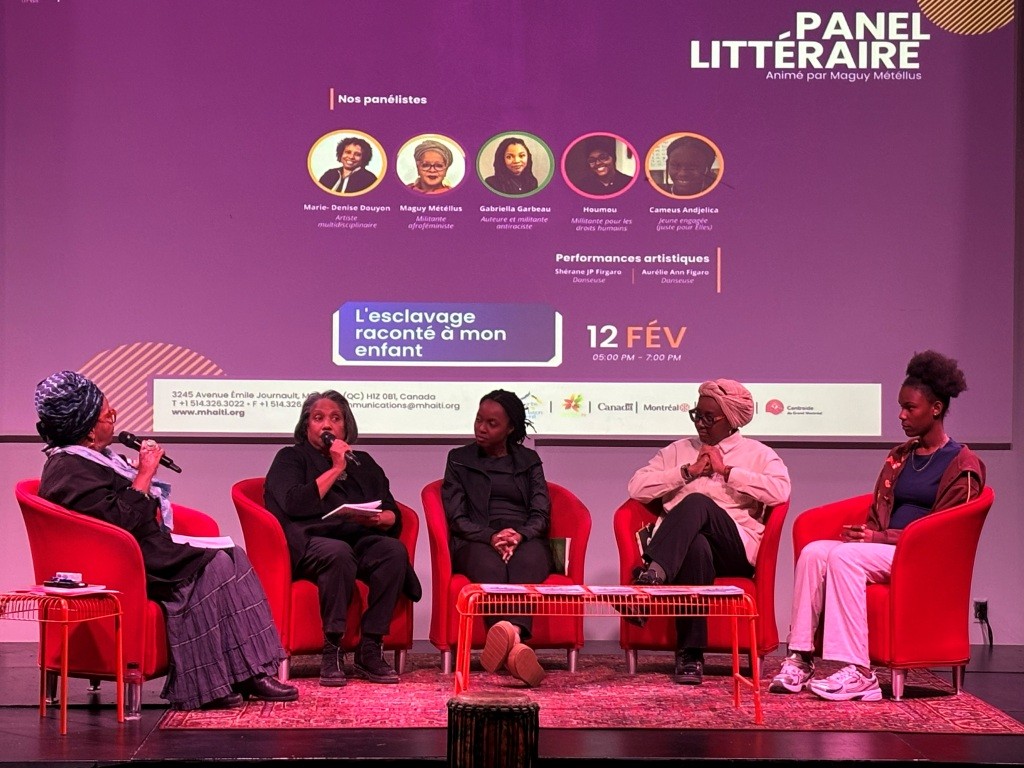Villeray. At Café Velours, several customers are drinking coffee or tea, studying, reading books, or chatting quietly. The place is peaceful and fairly busy. The atmosphere is conducive to discussion. We approach them with a question: how do you feel as a queer person during this election period?
A general lack of interest is evident among all those interviewed. Everyone seems to have accepted that their voices are not and probably will not be heard in this campaign. Everyone mentions a sense of detachment from the parties in the running. Unsurprisingly, they identify little or not at all with the politicians' rhetoric. Despite this, most will vote on April 28.
ALLISON: “The issues affecting the queer community are the same as those affecting the middle class.”
Allison is co-owner of Café Velours. When we arrive, she is chatting with a regular customer on the outdoor patio. Wearing a red hooded coat and a cap, she answers our questions energetically.
She is the first to denounce the lack of representation in federal politics, a topic that comes up in every interview. “I think there's a lack of politicians, queer or not, who address issues like housing, healthcare, and access to general services for the LGBTQ+ community,” she says.
Her tone reveals a strong sense of civic engagement. She cites the Palestinian genocide as her main political concern. It was the first issue she looked at on the various election platforms. After that, she scrutinizes everything related to everyday life.
“The issues affecting the queer community are the same as those affecting the middle class and the working class. We're talking about housing, health, safety, and employment,” she explains. ”The restrictions on freedom that affect queer people are often the same as those that affect women, people with disabilities, and many others.”
When asked about the overall sense of safety in Canada, she responds that she knows she is privileged. She is very concerned about the political situation south of the border. “I see how hard people are fighting for the rights of women, immigrants, and queer people, and how we could lose everything overnight,” Allison says. We see American fascism growing and gaining momentum. We don't want that for ourselves.”
FRANKIEB: “I feel like most of the actions that are being taken are performance-based.”
FrankieB sits down on a sofa at Café Velours, where we arranged to meet. FrankieB is dressed in black, wears large-framed glasses, has painted nails, and several piercings are visible on their face. FrankieB assures us that people turn to look at them when they walk down the street.
Feeling privileged to be able to exercise their right to vote, but not believing that their vote will change much, FrankieB is hesitant to vote. An activist and involved in the queer community, they believe that their volunteer work has more impact than going to the polls on April 28. “I find that, in general, politics is not accessible. This world lacks popularization. I find it complicated to follow the campaign and determine how the parties' decisions will affect my future.”
Once again, FrankieB does not feel concerned by this campaign: “I feel that our voices are not really listened to, and when they are, it's in a tokenized way. I feel like most of the actions that are taken are just for show.”
They then mention the absence of openly and visibly trans candidates, which prevents them from identifying with the world of federal politics.
Believing that living in Montreal is a privilege, FrankieB often thinks about the rise of fascism and the far right in the United States and the rights of Americans, which are regressing a little more every day: “Now, in Canada, we can legally change our gender markers and our names. But what's the point of being more visible if we don't have the protection that goes with it?”
For FrankieB, change must be built differently: “I don't think we necessarily need a political party to represent us. There are so many organizations doing extraordinary work on the ground, within the community. We need to give more resources to those who know best what queer people need.”
FLO: “I feel a rise in fascism and it scares me.”
Flo is non-binary. A barista at Café Velours, Flo joins us on the outdoor terrace. When asked for their opinion on this election period, a slight sigh escapes their lips: “I think we're all scared, especially with everything that's going on down south. I feel a slight disengagement from everything that's happening. I sense a rise in fascism, and it scares me.”
For the barista, the parties in the running are not making an effort to listen to the voices of the LGBTQ+ community; the trade war is taking center stage. Sensitive to the intentions of her riding's MP, Alexandre Boulerice of the New Democratic Party, Flo will be voting. The NDP is the party closest to her convictions, given its position on the Palestinian genocide.
Flo also believes that change must happen at the municipal level. That's where concrete action takes place, where people can feel comfortable getting involved. “I don't have high expectations for change at the federal level.”
JUNO: “As we enter a period of economic austerity, it's often marginalized communities that find themselves even more marginalized.”
We run into Juno on Sainte-Catherine Street in the Village. With his mustache and big smile, he comments with interest on the current political situation. He feels good about this election period. He likes the division that is emerging between the different parties in the running. For him, this may be a sign that the ruling party will be in a minority.
“For me, it would be an opportunity to have more 'democracy.' I think it's a good thing that there are several points being made right now, and that they're all equally strong,” he explains.
He is still thinking about which party to vote for. His first choice is the Green Party, but he is still undecided and wondering whether to give his vote to the NDP or the Bloc Québécois. He does have some reservations, however.
“No matter who gets elected, I think minorities will be a little more at risk than they have been in the past. As we fall into a period of economic austerity, it's often marginalized communities that find themselves even more marginalized. I'm afraid it's a cycle that will repeat itself,” he confides.
He, too, says he is more concerned about issues that affect his daily life: “Right now, what affects me the most is access to housing, the labour shortage, and the skyrocketing prices of groceries. Everything that mainly affects the middle class.”
MARIAM: “I'm not just queer, I'm racialized. I live in a reality where I can easily be targeted.”
Mariam is the other co-owner of Café Velours. A Canadian of Tunisian origin, she has been living in Canada for about 20 years.
“When I arrived here, I had an idea of what Canada's values were as a country. Twenty years later, I realize that it's all just 'window dressing'—the substance of those values is not a reality in everyday life,” she says with a look of disgust.
Like many people we spoke to, she feels a total disinterest and disengagement from the current political context. Mariam does not yet know who she will vote for. She plans to check the polls at the last minute and make her decision then. “I'm torn. There is no clear representation. I feel like all the platforms I've looked at are outdated, that they're just there to look good, the substance doesn't appeal to me,” she says, highlighting the possibility of a strategic vote.
The issues that concern the café's co-manager are many: “I'm not just queer, I'm a queer person of color. I live in a reality where I can easily be targeted. But I don't have any answers to my questions.”
She rolls her eyes: “I've never felt so unsafe. I feel like the political system contributes to that. There's no strengthening of community ties, of citizen ties, so that we can support each other and feel safe. I feel more separation, fragmentation.”
With the election just a few days away, the voters we spoke to are aware of the importance of going to the polls. However, they will do so without much conviction. The disconnect between their reality and the federal political world, as well as the lack of representation, are the main reasons for this. All of them argue that change must come from closer to home, from the community, where they are already involved.
*FrankieB is referring to tokenism, a practice that involves including members of marginalized communities in discourse, workspaces, or organizations in a symbolic rather than sincere or genuine way.






.jpg)



.jpg)